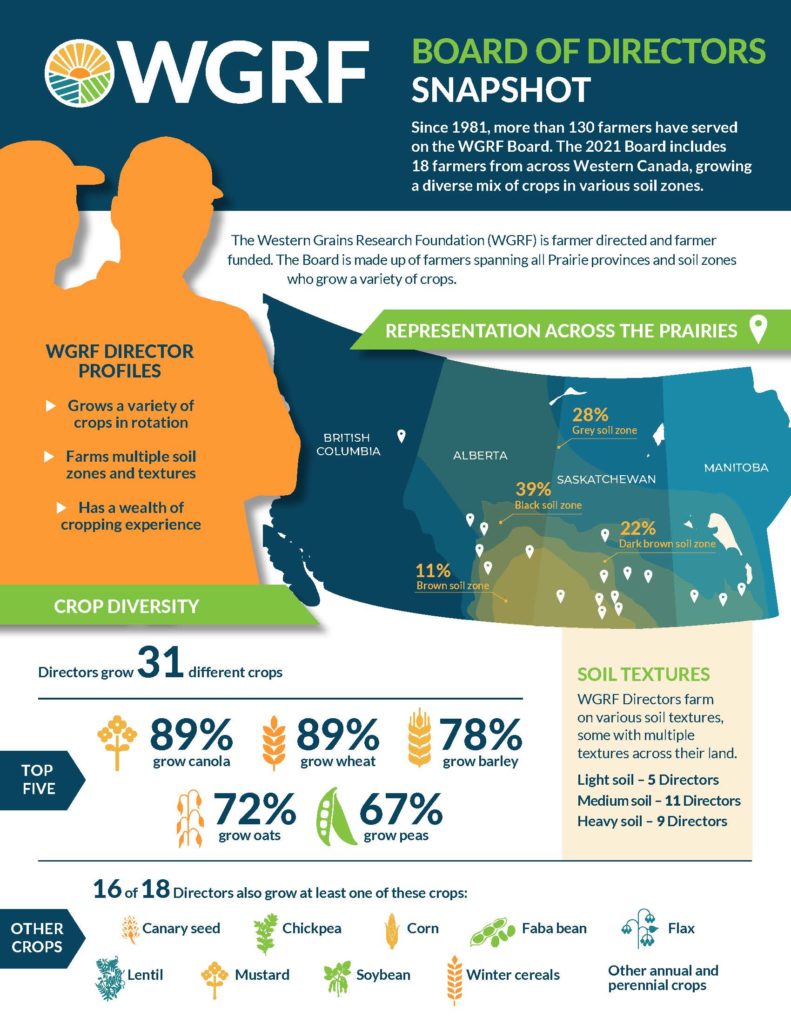WGRF Members Update
Research Funding Highlights
WGRF is projecting over $53M of research funding over the next four years for new and ongoing initiatives. This includes the Phase 1 and Phase 2 Capacity Initiatives, Five Research Clusters, and funding for both new and ongoing research projects. We look forward to collaborating with our partners in the ongoing funding of research to deliver on the vision of profitable and sustainable western Canadian grain farmers.
In May 2021 the Research Committee reviewed 133 Production LOI’s and 65 Variety Development LOI’s from the Agriculture Development Fund (ADF) and Agriculture Funding Consortium (AFC) calls. LOI’s from the Canola Agronomic Research Program (CARP) program will be reviewed by the Research Committee in August 2021 and Full Proposals from the Ag Action Manitoba (AAM) program will be reviewed along with the ADF, AFC, and CARP full proposals in October, with recommendations for funding to be considered by the Board in November 2021.
Future Changes in Crop Production and Implications for Research
WGRF’s research priorities and processes have evolved throughout its 40-year history, but we have always operated with the sole purpose of funding research to benefit western Canadian crop producers. With this in mind, WGRF commissioned a survey in early 2021 to identify and confirm cross cutting production issues of greatest concern to farmers. The survey was conducted by Amaethon Agricultural Solutions from January to March 2021. The Amaethon report can be found here
The Amaethon report was the first step. WGRF conducted a series of virtual workshops on July 20, 21, 22 to identify cross cutting research gaps (questions) arising from issues identified in the Amaethon Report. More than 130 people participated in the workshops. Each workshop consisted of a plenary session by theme:
- Crop and Soil Management (weeds, diseases, insects, plant nutrition)
- Precision Agriculture (variable rate, soil management zones, data)
- Sustainability (cropping systems, diversified crops, climate change)
Summaries of the issues, and research implications will be made public on the WGRF website and will be used for a Members’ Workshop in the fall of 2021 that will provide guidance to WGRF on cross cutting research priorities.
WGRF Governance
In the coming months the WGRF Chair and Executive Director will be contacting all Class A member organizations to explain a proposed bylaw change regarding qualifications of future Director nominees. The purpose of this change is to reduce potential conflicts of interest. We look forward to meeting with you and discussing this further.
WGRF Director Profile
Below is a profile of the WGRF Directors. The Board is made up of farmers spanning all Prairie provinces and soil zones who grow a variety of crops.

Phase 2 Capacity Initiative
The Board has approved more than $24 Million to expand the tools (infrastructure and equipment) necessary to accelerate crop research. To date, we have announced more than $2.7 million to 9 institutions across western Canada with many more to come once final agreements are signed. Through seeding and the growing season, we are beginning to see and hear about the impact our investments have been having at the research institutions.
- $253,000 Farming Smarter – plot seeder and plot combine
- $293,492 Gateway Research Organization – plot combine.
- $727,470 Indian Head Research Fndtn – equipment and infrastructure.
- $288,550 U of A Wheat Breeding – plot seeder and combine.
- $266,931 Conservation Learning Centre – plot combine.
- $266,942 Chinook Applied Research Assoc – field equipment.
- $300,000 Mackenzie Applied Research Assoc.
- $60,440 East Central Research Fndtn – infrastructure.
- $284,000 U of A Breton Plots – field equipment.
Field Hero’s
The Beneficial Insect campaign continues to be a successful project for WGRF. We provide tools to help growers and agronomists identify the most common beneficial insects found across western Canada. We launched season 2 of the Pest and Predators podcast with Shaun Haney this summer on Real Agriculture. The podcasts performed well this year, acting as a relevant, timely connection between the science and the farmer’s field. Resulting in almost 2500 downloads and 680 YouTube views for episodes this year.
A comprehensive field guide was developed and is available for download and print for free. We have had a tremendous response for the field guide from industry influencers. Orders are beyond expectations given the uncertainty of in-person events. To date we have shipped out over 1000 copies of the guides across Western Canada.
